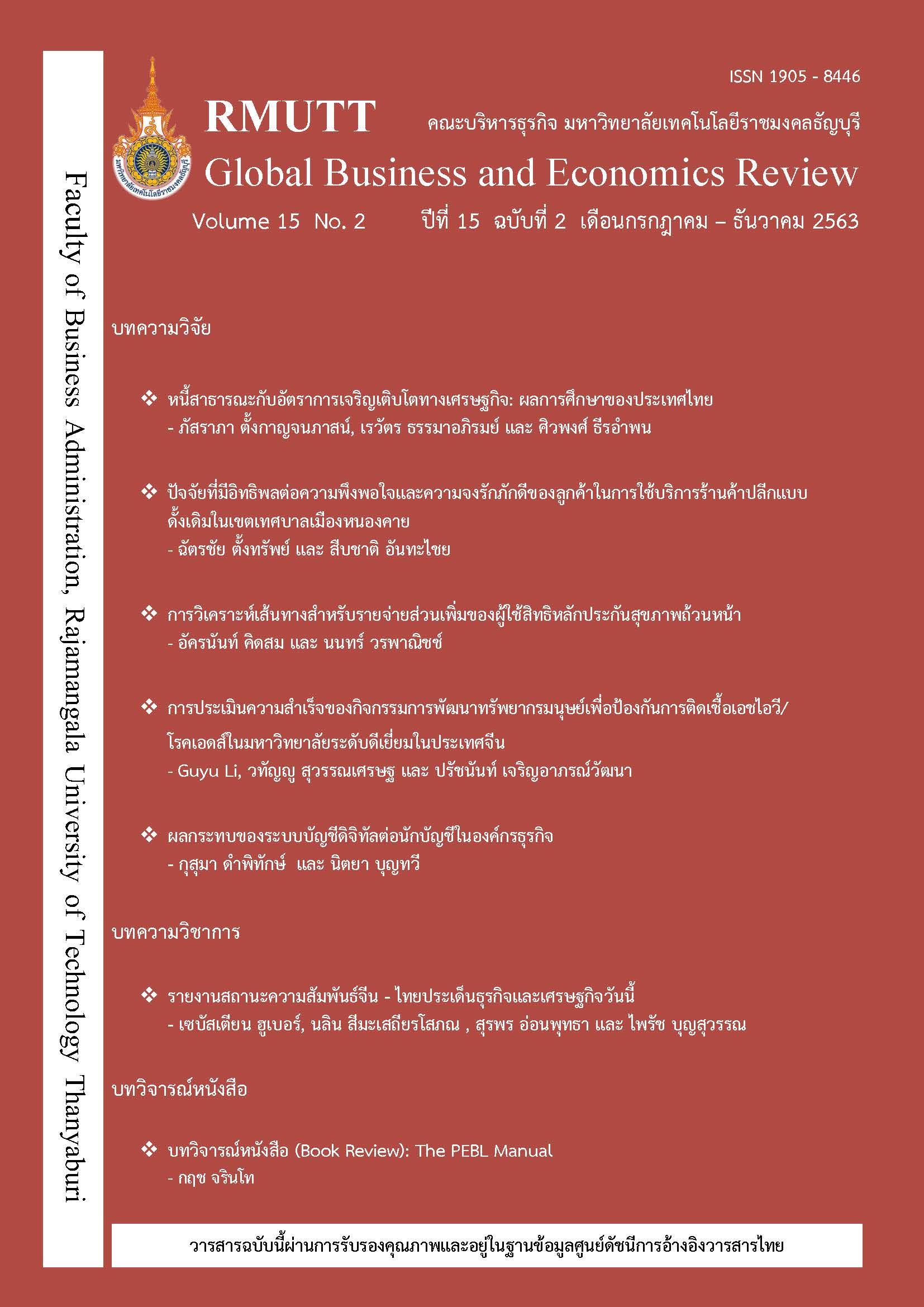THE IMPACT OF DIGITAL ACCOUNTING SYSTEM ON BUSINESS CORPORATION ACCOUNTANTS
Keywords:
Digital Accounting System, Accountant’s Role, Accountant’s CharacteristicAbstract
The objectives of this research are to study the impacts of digital accounting systems on accountant's role in the business organization using institutional logic. This research is quantitative research using questionnaire collect from accountants and qualitative research by using in-depth interview from executive of organization. The results revealed that the digital economy has affected a technology disruption and developing the competitiveness of business organizations. Corporate executives need accurate and timeliness financial information and expected accountants to use digital accounting as a tool for strategic and business process reporting related to decision making. The accountants’ role has changed to use electronic methods, to work as a team with other areas and using the company database for analyzing, budgeting, in accordance with the direction of the organization. Accountants had to develop themselves to familiar with the digital accounting systems, with accurate and clear knowledge in accounting standards and as electronics accounting system designer. Although the digital accounting could solve issues involving human such as disciplinary problems, accountant’s productivity, and accountants shortages, high level of works such as analytical aspect could not be completely replaced by digital systems and can only be done by human.
References
กุสุมา ดำพิทักษ์. (2562). ระบบบัญชีดิจิทัล: แนวโน้มของเทคโนโลยีสารสนเทศสมัยใหม่ที่ส่งผลกระทบต่อนักบัญชีไทย. ปทุมธานี: คณะบริหารธุรกิจ มหาวิทยาลัยเทคโนโลยีราชมงคลธัญบุรี.
ประสัณห์ เชื้อพานิช. (2559) ASEAN perspective on digital economy. FAP International Conference 2016. หน้า 8-15. สืบค้นจาก http://fap.sogoodweb.com/upload/9414/jAv2QeDCkv.pdf
พัชรินทร์ ใจเย็น, กฤษฎา มณีชัย, ธัญลักษณ์ ครึ่งธิ และ ณัฐวัชต์ บุญภาพ. (2017) นักบัญชีกับเทคโนโลยียุคปัจจุบัน. The Journal of Pacific Institute of Management Science, 3(1), 196-207.
วัทธยา พรพิพัฒน์กุล. (2563). นักบัญชีบริหารในยุคดิจิทัล. Retrieved from: https://www.tfac.or.th/Article/Detail/126283
สภาอุตสาหกรรมแห่งประเทศไทย. (2561). เศรษฐกิจ Digital ความท้าทายของเศรษฐกิจไทย. กรุงเทพฯ:โรงพิมพ์แห่งจุฬาลงกรณ์มหาวิทยาลัย.
Alamin, A., Yeoh, W., Warren, M., & Salzman, S. (2015). An empirical study of factors influencing accounting information systems adoption. In Twenty-Third European Conference on Information Systems (ECIS) (pp. 1-11). Münster, Germany: ECIS.
Bacon, G. (2013). Characteristics of a professional accountant. Retrieved from https://careertrend.com/what-characteristics-should-an-accountant-have-13654421.html
CGMA. (2018). Building a better business, together: welcome to finance business partnering. Retrieved from https://www.cgma.org/content/dam/cgma/resources/reports/ downloadabledocuments/cgma-finance-business-partnering.pdf
Chen, H. J., Yan Huang, S., Chiu, A. A. & Pai, F. C. (2012). The ERP system impact on the role of accountants. Industrial Management and Data Systems, 112(1), 83-101.
Deshmukh, A. (2006). Digital accounting: The effects of the internet and ERP on accounting, Pennsylvania: Penn State University.
Dobson. (2017). Robots vs humans: collaboration or competition? news and insights, voice of the workforce, AI and robotics, technology. Retrieved from https://www.networkerstechnology.com/VoW_RPA
Elliott, R. K. (1998, February). Who are we as a profession and what must we become?. Journal of Accountancy, 81-85.
FAP. (2016). ASEAN perspective on digital economy. In FAP International Conference 2016 (น. 8-15). สืบค้นจาก http://fap.sogoodweb.com/upload/9414/jAv2QeDCkv.pdf
Fernandez, D., & Aman, A. (2018). Impacts of robotic process automation on global accounting services. Asian Journal of Accounting and Governance, 9, 127-140.
Fernandez, D., Zainol, Z. & Ahmad, H. (2017). The impacts of ERP systems on public sector organizations. Procedia Computer Science, 111, 31-36.
Friedland, R., & Alford, R. R. (1991). Bringing society back in: Symbols, practices, and institutional contradictions’ In The New Institutionalism in Organizational Analysis. ed. Walter W. Powell and Paul J. DiMaggio, pp. 232–263. Chicago: University of Chicago Press.
Harrison, D. A., Mykytyn, P. P., & Riemenschneider, C. K. (1997). Executive decisions about adoption of information technology in small business: Theory and empirical tests. Information Systems Research, 8(2), 171-195. Retrieved from:https://doi.org/10.1287/isre.8.2.171
Kane, G. C., Palmer, D., Phillips, A. N., & Kiron, D. (2015). Is your business ready for a digital future?. MIT Sloan Management Review, 56(4), 37-44.
Kanellou, A. & Spathis, C. (2013). Accounting benefits and satisfaction in an ERP environment. International Journal of Accounting Information Systems, 14(3), 209-234.
Lacity, M. & Willcocks, L. (2015). Robotic process automation: The next transformation lever for shared services. Retrieved from http://www.umsl.edu/~lacitym/OUWP1601.pdf
Nicholson, B. & Aman, A. (2012). Managing attrition in offshore finance and accounting outsourcing: Exploring the interplay of competing institutional logics. Strategic Outsourcing: An International Journal, 5(3), 232-247.
Parker, L. H. (2016). Financial services firms set to up their spend on disruptive technologies. Retrieved from https://scotlandb2b.co.uk/2016/08/31/financial-services-firms-setto-up-their-spend-on-disruptive-technologies/
Sahay, S., Sæbø, J. I., Mekonnen, S. M. & Gizaw, A. A. (2010). Interplay of institutional logics and implications for deinstitutionalization: case study of HMIS implementation in Tajikistan. Information Technologies and International Development, 6(3), 19.
Schatsky, D., Muraskin, C. & Iyengar, K. (2016). Robotic process automation; a path to the cognitive enterprise. Deloitte University Press. Retrieved from https://www2.deloitte.com/content/dam/insights/us/articles/3451_Signals_Robotic-process-automation/DUP_Signals_Robotic-process-automation.pdf
Shanker, S. (2017). What characteristics should an accountant have?. Retrieved from https://careertrend.com/what-characteristics-should-an-accountant-have13654421.html
Smith, A. & Anderson, J. (2014). AI, Robotics, and the Future of Jobs. Retrieved from https://www.pewresearch.org/internet/2014/08/06/future-of-jobs/
Thornton, P. H. (2004). Markets from culture: institutional logics and organizational decisions in higher education. Stanford, Calif.: Stanford Business Books.
Thornton, P. H., & Ocasio, W. (1999). Institutional logics and the historical contingency of power in organizations: executive succession in the higher education publishing industry, 1958 – 1990. The American Journal of Sociology, 105(3), 801-843.
Thornton, P. H., Ocasio, W., & Lounsbury, M. (2012). The institutional logics perspective: a new approach to culture, structure, and process. Oxford: Oxford University Press.
Van der Stede, W. A., & Malone, R. (2010). Accounting trends in a borderless world. London: CIMA.
William, I. (2015). 10 personality traits every accountant should have. Retrieved from https://www.intuitiveaccountant.com/people-and-business/10-personality-traits-every-accountant-should-have/#.Xm4VbagzZPZ.
Downloads
Published
How to Cite
Issue
Section
License
The articles published in this journal are the intellectual property of their respective authors.
The views and opinions expressed in each article are solely those of the individual authors and do not reflect the positions of Rajamangala University of Technology Thanyaburi or any of its faculty members. All components and content of each article are the sole responsibility of the respective authors. In the event of any errors, the authors shall bear full responsibility for their own work.








